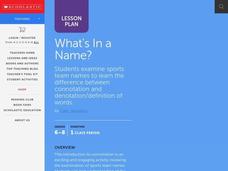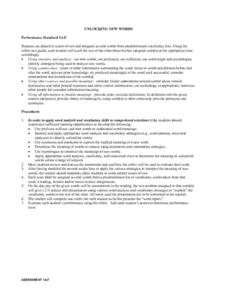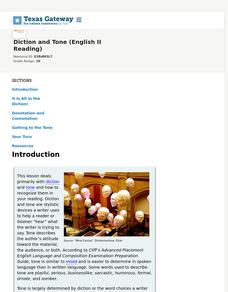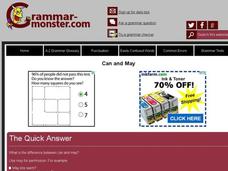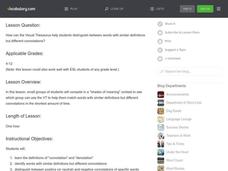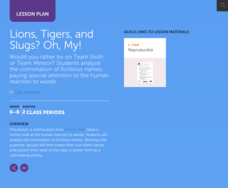Prestwick House
Connotative vs. Denotative Meanings
Besides the dictionary definition, words also carry the added weight of meanings that are inferred or implied, meanings conferred on words, or connotations. To gain an understanding the importance of connotation, class members engage in...
Curated OER
What's In a Name?
Introduce your language arts class to connotation, denotation, and diction. Middle schoolers identify and differentiate between the connotative and denotative meanings of words by analyzing the fictitious sports team names. Learners...
Curated OER
Speak Write! Understanding the Hidden Meaning of Words
"Can the connotation of a word or phrase create bias or prejudice?" The activities in this SMART Board lesson are directed toward this question, which will be sure to incite lots of opinions and ideas. The SMART Board file guides them...
Curated OER
Unlocking New Words: Partner Presentations
Following extensive modeling about how to apply word analysis and vocabulary skills to learn new words, partner teams create brief word presentations to teach new vocabulary to the class. Preselect words from upcoming social studies,...
Curated OER
Connotation: Three Lessons for Effective Word Choice
Over the course of three days, middle schoolers explore the concept of connotation. They differentiate between the connotative and denotative meanings of sports team names, develop their own team names, logos, and text, and revise a news...
Curated OER
Speak Write! Understanding the Hidden Meaning of Words
Students investigate connotation and denotation as a basis for greater examining of language. They identify the literal meaning of words and explore the greater implications and impact of word usage.
K12 Reader
Winter Adjectives: Shades of Meaning
Is wet damper than soggy? Young grammarians consider shades of meaning by ranking a set of winter adjectives from the weakest to the strongest.
Curated OER
Connotation and Denotation: How Word Choice Affects a Paragraph
Review the terms denotation, connotation, diction, and mood in paragraph writing. After defining the terms, middle schoolers practice writing examples of both connotation and denotation. They complete a connotation and denotation graphic...
Curated OER
"Shooting an Elephant"
Study selected vocabulary terms in George Orwell's "Shooting an Elephant." A chart includes five selections, and learners must record the connotative and denotative meaning for each. A great look at using the context to define vocabulary...
Texas Education Agency (TEA)
Diction and Tone (English II Reading)
Words carry baggage. In addition to their literal, denotative meaning, words also carry the weight of the associations and connotations attached to the word—the connotations of words writers use to create the tone of a piece. An...
Prestwick House
"Because I could not stop for Death" -- Visualizing Meaning and Tone
Emily Dickinson's "Because I could not stop for Death" provides high schoolers with an opportunity to practice their critical thinking skills. They examine the images, diction, rhythm, and rhyme scheme the poet uses and consider how...
Curated OER
Shades of Meaning
Examine and distinguish between words that have similar definitions but different connotations. Middle schoolers define connotation and denotation and participate in a "shades of meaning" contest in small groups. Groups use the Visual...
Curated OER
Express Yourself Lesson Seed 2
Use Langston Hughes's poem, "Words Like Freedom," to explore the concepts of freedom and liberty. Learners read the poem, determine the theme, and use the provided graphic organizer to examine the connotative and denotative meanings of...
Curated OER
Easily Confused Words: Can and May
Can is one of the most commonly misused words. In actuality, may should be used in many of the sentences can tends to appear in. Review these example sentences with your third and fourth graders, and then have them complete the short,...
K20 LEARN
Things Are Lit at Thornfield: Jane Eyre
Jane Eyre offers scholars an opportunity to practice reading comprehension skills. Pairs are assigned a word from the text, use their prior knowledge, and consider the context, connotation, and denotation of the word to posit a...
Curated OER
Shades of Meaning
Learners use words with similar meanings to analyze implied meanings. In this word connotation lesson, the teacher introduces the activity by asking students whether a new product should be advertised as "newfangled" or "cutting-edge." ...
Novelinks
The Little Prince: Brainstorming Activity
What do you think of when you hear the word adult? Or friend? Learners brainstorm with a group of peers to list the words they think of when they hear seven words from Antoine de Saint-Exupéry's The Little Prince.
California Federation of Chaparral Poets, Inc
Poetic Devices
Have everything you need to know about the elements of poetry with a nine-page handout. Split into four categories—word sounds, meanings, arrangement, and imagery—budding poets may reference terms, read definitions, descriptions, and...
Curated OER
Connotation, Denotation, Explanation
Middle schoolers use this connotation and denotation worksheet to develop vocabulary skills. They take notes on the terms, study examples, and choose from pairs of words to find the more positive or negative word choice, as directed....
Curated OER
Square Roots
Learners differentiate between perfect roots and rational roots. In this algebra lesson, students perform operation using roots. They add, subtract, multiply and divide rational expressions.
Curated OER
Connotation and Denotation:
Eighth graders investigate the effect that connotations can have on writing. They are shown examples to build background knowledge before attempting the exercise. They finish by writing a paragraph to practice what they have learned.
Curated OER
Connotation: "My Papa's Waltz" by Theodore Roethke
What's happening in this poem? Have your high schoolers participate in an activity about connotation and denotation. They apply the concept of connotation to a reading of Theodore Roethke's poem "My Papa's Waltz." Lead a discussion about...
Scholastic
Lions, Tigers, and Slugs? Oh, My!
Explore the power of words with your class by analyzing the connotations of fictitious sports team names. Learners discuss team names and the mental images they convey. They create logos to illustrate the meanings and connotations of...
EngageNY
Grade 10 ELA Module 2: Unit 2, Lesson 2
What is a megalomaniac? Scholars discover the word's meaning as they read and analyze paragraphs seven and eight from Julia Alvarez's essay "A Genetics of Justice." They also read Mark Memmott's article "Remembering to Never Forget" and...



